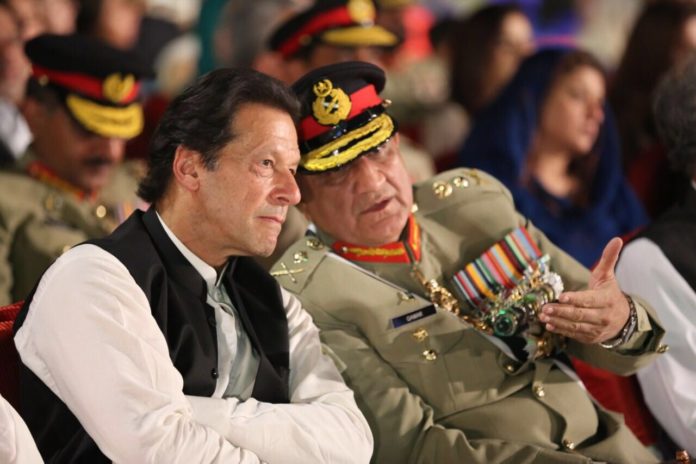Pakistan’s economy is in dire crisis and the government’s response over the last few months has been: change the entire finance team at all levels and bring Musharraf/army supported technocrats to replace the existing team and now set up a National Development Council (NDC) that includes not just the finance and planning ministers but the Chief of Army Staff. The NDC is ostensibly supposed to “set policies and strategies for development; formulate and tailor policies to achieve accelerated economic growth; approve long term planning for national and regional connectivity, and provide guidelines for regional cooperation.”

In which country, aside from Pakistan, is the Army Chief part of a committee meant to boost economic growth and development. As The Economist wrote in January 2019 “Pakistan’s army is to blame for the poverty of the country’s 208m citizens. It has fostered the paranoia and extremism that hold the country back.”
As investigative journalist Taha Siddiqui writes, “Pakistan’s economy is in a crisis, with a $100-bn debt and inflation at a four-year-high of nearly 9%, but the army is pushing for expanding its businesses and budgetary allocations. A recent international investigation found that the military-controlled engineering firm Frontiers Works Organization (FWO) plans to go into the lucrative mining sector and wants a key role in Balochistan’s Reko Diq mine, which has one of the world’s largest untapped copper and gold deposits. And, it appears that the government may favour it over other investors. nother sector where the military seems to be getting preferential treatment is oil and gas exploration. The Frontier Oil Company, a subsidiary of FWO, has been granted a contract for a 470km-long oil pipeline that is estimated to cost $370 million. Reports suggest that due process has not been followed in awarding this contract.”
According to Dawn economic columnist Khurram Hussain “The situation on the ground is almost red hot now. You cannot spin inflation, and you cannot plug macroeconomic deficits with emotional appeals. It is true that the government did not create this situation, they inherited it. But it is equally true that at the time when they arrived in power and the deficits were growing, the prime minister was busy talking about the dam fund, making emotional appeals for contributions, and then about distributing chickens among the poor, and ‘recovering looted wealth’ to plug these deficits. The government inherited the situation, but never took it seriously and always believed that it could be addressed through charity, lottery or begging from ‘friendly countries’. And that’s what they did for nine months. In the meantime, the revenue effort flat-lined altogether, the business community duped them into major subsidies and incentives and egged on a devaluation, only to deliver flat export proceeds in return.”
As Hussain notes, foreign exchange reserves were $9.8 billion in August 2018 when this government came into power. After $3bn borrowed from Saudi Arabia, $2bn from the UAE, $2.2bn from China (among other borrowing), the reserves now stand at $8.8bn. So as he asks “What happened to all this money? The answer is simple: it was digested in the bowels of the economy’s dysfunctions, leaving us more indebted (domestically and internationally) and even more precariously teetering on the brink of financial insolvency. Meaning the adjustment that was necessary back in September had acquired overriding urgency by May. Now the government is in a position of digging itself out of a deeper hole where the reserves are concerned, and claw out more taxes in order to bridge the fiscal deficit. Hence, the brutal nature of the ongoing adjustment. It has to make up for lost time while trying to get ahead of a rapidly deteriorating situation.”
Maybe as academic and public intellectual Pervez Hoodbhoy notes “In a mathematically savvy country no major project — civil works, manufacturing, or health — is approved without a full fiscal and cost/benefit analysis, detailed supply chain management, and logistics connecting the nodes. Teams of technical experts guide political leaders through the maze. But for Pakistani decision-makers, whim suffices. Why so few genuine Pakistani experts and why is math illiteracy so rampant? We have good soldiers but not a single top-level Pakistani mathematician anywhere in the world — even those recently decorated with Pakistan’s highest national awards for mathematics would probably flunk undergrad math exams at places like MIT. Why is the math taught in our schools and universities ridiculously bad? The answer has two parts. First, most people confuse math with arithmetic and with cut-and-dried formulas. But it’s not that! Mathematics is the music of reason whose rich melodies need good tutoring and hard work to understand. Second, math matters much but only if you think the laws of physics, expressed mathematically, actually govern the physical universe. Where Inshallah holds sway, math based predictions are easily overridden. Precise planning then becomes useless or secondary; math skills are unneeded.”
![]()





